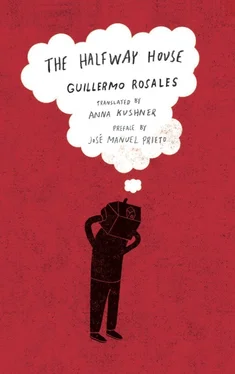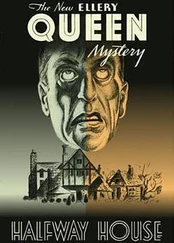At some point in 1987 his friend, the writer Carlos Victoria, sent the manuscript for The Halfway House to the prestigious Letras de Oro (Golden Letters) contest, sponsored by American Express and with Octavio Paz, the Mexican future Nobel laureate, on the jury. Thanks to its obvious structural qualities and the cataclysmic power of the story, the book ended up winning. Nonetheless, nothing happened: the book had a luke- warm reception among Spanish-language critics and for years was known only by a few people.
In 2002, the French edition published by Actes Sud with the title Mon Ange ( My Angel ) was a resound- ing success. The newspaper Le Monde praised it as “a spectacular autobiographical fable” as well as a “lyrical and lapidary” novel. The following year, it was reissued in Spain under the title La Casa de los Náufragos ( The House of the Shipwrecked ) to great acclaim.
In 1993, the time of his death, Guillermo Rosales was forty-seven years old.
The house said “boarding home” on the outside, but I knew that it would be my tomb. It was one of those marginal refuges where the desperate and hopeless go — crazy ones for the most part, with a smattering of old people abandoned by their families to die of loneliness so they won’t screw up life for the winners.
“You’ll be fine here,” my aunt says, seated at the wheel of her straight-off-the-assembly-line Chevrolet. “You’ll understand that nothing more can be done.”
I understand. I’m almost grateful that she found me this hovel to live in so that I don’t need to sleep on benches and in parks, covered in grime and dragging sacks of clothes around.
“Nothing more can be done.”
I understand her. I’ve been admitted to more than three psychiatric wards since I’ve been here, in the city of Miami, where I arrived six months ago, fleeing the culture, music, literature, television, sporting events, history and philosophy of the island of Cuba. I’m not a political exile. I’m a complete exile. Sometimes I think that if I had been born in Brazil, Spain, Venezuela or Scandinavia, I would have also fled those streets, ports and meadows.
“You’ll be fine here,” my aunt says.
I look at her. She gives me a long, hard look. There’s no pity in her dry eyes. We get out of the car. The house said “Boarding Home.” It’s one of those halfway houses that pick up the dregs of society. Beings with empty eyes, dry cheeks, toothless mouths, filthy bodies. I think such places exist only here, in the United States. They’re also known simply as homes. They’re not government-run. They’re private houses that anyone can open as long as he gets a license from the state and completes a paramedic course.
“…a business just like any other,” my aunt explains to me. “A business like a funeral home, an optician’s, a clothing store. You’ll pay three hundred dollars here.”
We opened the door. There they all were: René and Pepe, the two mentally retarded men; Hilda, the decrepit old hag who constantly wets herself; Pino, a gray, silent man who just glares at the horizon with a hard expression; Reyes, an old one-eyed man whose glass eye constantly oozes yellow liquid; Ida, the grande dame come to ruin; Louie, a strong American with greenish-yellow skin who constantly howls like a mad wolf; Pedro, an old Indian, perhaps Peruvian, silent witness to the world’s evils; Tato, the homosexual; Napoleon, the midget; and Castaño, a ninety-year-old geezer who can only shout “I want to die! I want to die! I want to die!”
“You’ll be fine here,” my aunt says. “You’ll be among Latinos.”
We go on. Mr. Curbelo, the owner of the Home, is waiting for us at his desk. Did I find him repulsive from the very beginning? I don’t know. He was fat and shapeless, and was wearing a ridiculous track suit made all the worse by a juvenile baseball cap.
“Is this the man?” He asks my aunt with a smile on his face.
“This is him,” she responds.
“He’ll be fine here,” Curbelo says, “like he’s living with family.”
He looks at the book I’m carrying under my arm and asks, “Do you like to read?”
My aunt responds, “Not only that. He’s a writer.”
“Ah!” Curbelo says with mock surprise. “And what do you write?”
“Bullshit,” I say softly.
Then Curbelo asks, “Did you bring his medicines?”
My aunt looks in her purse.
“Yes,” she says. “Melleril. One hundred milligrams. He has to take four a day.”
“Good.” Mr. Curbelo says with a satisfied face. “You can leave him then. We’ll take care of everything else.”
My aunt turns to look into my eyes. This time, I think I see the slightest trace of pity.
“You’ll be fine here,” she assures me. “Nothing more can be done.”
My name is William Figueras, and by the age of fifteen I had read the great Proust, Hesse, Joyce, Miller, Mann. They were for me what saints are to a devout Christian. Twenty years ago, I finished writing a novel in Cuba that told a love story. It was the story of an affair between a communist and a member of the bourgeoisie, and ended with both of them committing suicide. The novel was never published and my love story was never known by the public at large. The government’s literary specialists said my novel was morose, pornographic, and also irreverent, because it dealt harshly with the Communist Party. After that, I went crazy. I began to see devils on the walls, to hear voices that insulted me — and I stopped writing. All I produced was a rabid dog’s froth. One day, thinking that a change of country would save me from madness, I left Cuba and arrived in this great American country. There were some relatives waiting for me here who didn’t know anything about my life and who, after twenty years of separation, barely knew me anymore. They thought a future winner was coming, a future businessman, a future playboy, a future family man who would have a future house full of kids, and who would go to the beach on weekends and drive fine cars and wear brand-name clothing like Jean Marc and Pierre Cardin . The person who turned up at the airport the day of my arrival was instead a crazy, nearly toothless, skinny, frightened guy who had to be admitted to a psychiatric ward that very day because he eyed everyone in the family with suspicion and, instead of hugging and kissing them, insulted them. I know it was a great disappointment for everyone, especially for my aunt who was expecting something great. They got me instead. An embarrassment. A terrible mark on this fine Cuban petit bourgeois family with their healthy teeth and buffed fingernails, radiant skin, fashionable clothes, who were weighed down by thick gold chains and owned magnificent cars of the latest make and spacious houses with well-stocked pantries and central heat and air-conditioning. That day (the one on which I arrived), I know that they all eyed each other with embarrassment, made some scathing comments and drove off from the airport without any intention of ever seeing me again. And that’s the way it’s been. The only one who remained faithful to the family ties was this Aunt Clotilde, who decided to make herself responsible for me and kept me at her house for three months, until the day when, at the advice of other friends and relatives, she decided to stick me in the halfway house: the house of human garbage.
“Because you’ll understand that nothing more can be done.”
I understand her.
This halfway house was, originally, a six-room house. Perhaps it was once inhabited by one of those typical American families who fled Miami when the Cubans fleeing communism began to arrive. Now the halfway house has twelve tiny rooms, with two beds in each room. In addition, it has an ancient television set that’s always broken, and a kind of living room with twenty folding chairs that are falling apart. There are three bathrooms, but one of these (the best one) is reserved for the boss, Mr. Curbelo. The toilets in the other two are always clogged since some of the residents stick in them old shirts, sheets, curtains and other cloth materials that they use to wipe their behinds. Mr. Curbelo does not give us toilet paper, although he is supposed to by law. There is a dining room, outside the house, tended by a Cuban mulata with scores of religious necklaces and bracelets whose name is Caridad. But she doesn’t cook. If she were to cook, Mr. Curbelo would have to pay her an additional thirty dollars per week, and that’s something Mr. Curbelo would never do. So Mr. Curbelo himself, with his bourgeois little face, is the one who makes the stew every day. He makes it in the simplest way, by taking a handful of peas or lentils and dropping them (plop!) in a pressure cooker. Maybe he adds a little garlic powder. The rest, rice and a main dish, comes from a home delivery service called “Sazón,” whose owners, knowing they’re dealing with a nut house, pick the worst they have and send it over any which way in two huge greasy pots. They should send enough food to feed twenty-three people, but they only send enough for eleven. Mr. Curbelo thinks this is enough and no one complains. But if a complaint does arise, then Mr. Curbelo, without even looking at the person, says, “You don’t like it? Well if you don’t like it, leave!” But … who’s going to leave? Life on the streets is hard. Even for crazy people whose brains are on the moon. And Mr. Curbelo knows this and repeats, “Leave, quickly!” But nobody leaves. The complainer lowers his eyes, grabs his spoon and goes back to swallowing his raw lentils silently.
Читать дальше












